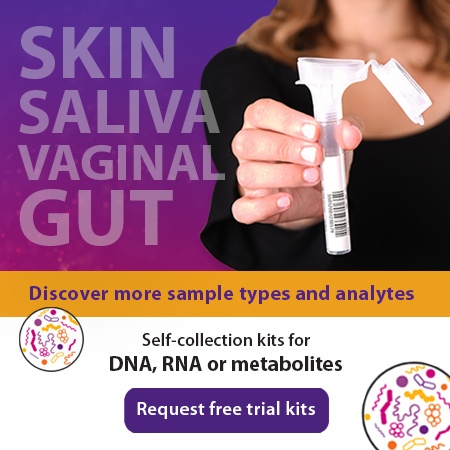2020-12-16
We have all heard about the benefits of probiotics, whether it was through a commercial promoting probiotic yogurt or a supplement you take to help with digestion. Probiotics or live bacteria can help modulate your intestinal microbiome, immune system and infections. A team from Duke University in Durham, North Carolina, is exploring the impact of probiotics in COVID-19 transmission with a new clinical trial: Probiotics To Eliminate COVID-19 Transmission in Exposed Household Contacts (PROTECT-EHC). In the latest episode of DNA Genotek’s podcast Molecules, Microbes and Multiomics, I had the pleasure of speaking with the leaders of the PROTECT research team, Dr. Paul Wischmeyer and Dr. Anthony Sung. This blog highlights some of the key takeaways from that episode.
If you are interested in listening to the full podcast, you can click on the link below.
Probiotics and viral infections
According to Dr. Wischmeyer, most people are not aware of the potential of probiotics for reducing the severity of Infectious disease. He explained how there is a great deal of data available regarding the use of probiotics for infections, which he and his team believe could also be applied to COVID-19.
“We have data studying benefit of probiotics in animals with infections that resemble human infections, such as pneumonia or abdominal infections. If you give probiotics at the time those infections start, there is much greater ability to clear the infection, thereby reducing the spread of those infections in the body and allowing those animals to survive at a much greater rate. We found that this occurs through effects that probiotics have on the ability of the body to clear viruses and bacteria and regulation in the way we respond to and control inflammation. For example, we know COVID-19 leads to a high inflammatory state, injuring the lungs and other organs. Our data indicates probiotics may reduce that inflammatory injury and help the body resolve the inflammation.” - Dr. Paul Wischmeyer
“There have also been numerous studies showing probiotics can significantly reduce respiratory infections in adults by 30-50% [1] [2].” - Dr. Paul Wischmeyer
Probiotics, gut microbiome and COVID-19 – the clinical trial
The role of the microbiome and viral infections has sparked hundreds of publications. Dr. Wischmeyer and Dr. Sung saw the potential of the microbiome (specifically the gut microbiome) and viewed it as a huge opportunity to understand its role within the SARS-CoV-2 viral infection.
“The real role [of reducing viral infections] is not just probiotics, but the probiotics manipulation of the microbiome.” - Dr. Paul Wischmeyer
With the growing research of the potential power of probiotics to prevent COVID-19, Dr. Sung and Dr. Wischmeyer designed a clinical trial with a population at a high risk of developing COVID-19 due to household contacts.
According to Dr. Sung, you have a tenfold increased risk of developing COVID-19 yourself if you are living with an individual who’s recently been diagnosed.
“Most of the therapies for COVID-19 are usually done in-person [at hospital or clinics]. Just now we are starting to have outpatient therapies, but there is a need for prevention and prophylaxis therapies too.” - Dr. Anthony Sung
Recruitment
Dr. Paul Wischmeyer and Dr. Anthony Sung are currently recruiting exposed household contacts in two ways:
- Identifying patients who have been diagnosed with COVID-19 and reaching out to them to ask their permission to contact the people who live with them
- For potential study participants, who are exposed to COVID-19 at home when a family member is diagnosed , can sign up directly online on the PROTECT-EHC website
The participants will receive the easy-to-use self-collection kits (OMNIgene•GUT) and (ORAcollect·RNA) in the mail to collect their stool and nasal samples remotely to comply with social distancing. Participants can then return the samples to the university where they will be analyzed at a later date.
Enrolling in the clinical trial
If you or anyone you know has a household member who has been diagnosed with COVID-19 in the U.S.A and is interested in joining the PROTECT-EHC clinical trial, you can visit their website at https://sites.duke.edu/protectehc/ or send them an email at protect-ehc@duke.edu. All study procedures and consent can be done at home, and no doctor or hospital visits are needed. All study materials are sent directly to the subject’s home, and all data collection is simple and online.
References:
[1] Hao Q, Dong BR, Wu T. Probiotics for preventing acute upper respiratory tract infections. Cochrane Database of Systematic Reviews. 2015(2).
[2] Chan CKY, Tao J, Chan OS, Li H-B, Pang H. Preventing respiratory tract infections by synbiotic interventions: a systematic review and meta-analysis of randomized controlled trials. Advances in Nutrition. 2020.


